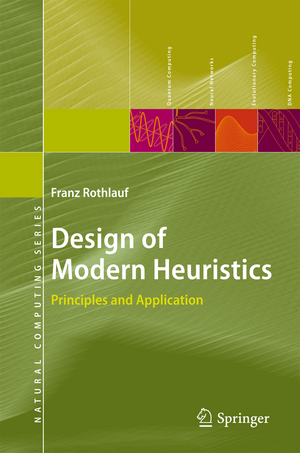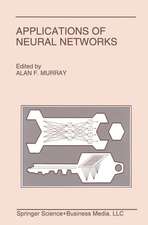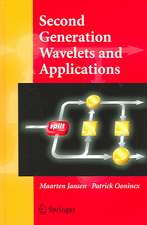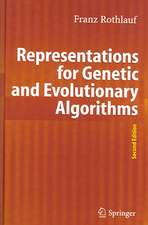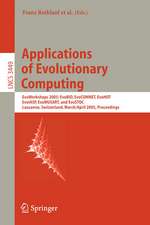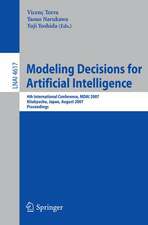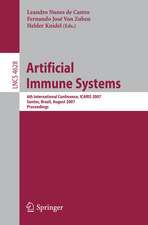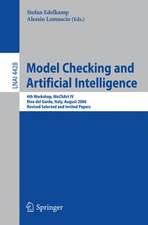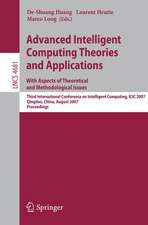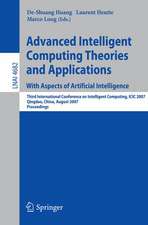Design of Modern Heuristics: Principles and Application: Natural Computing Series
Autor Franz Rothlaufen Limba Engleză Hardback – 17 iul 2011
The author takes a different approach in this textbook by focusing on the users' needs and answering three fundamental questions: First, he tells us which problems modern heuristics are expected to perform well on, and which should be left to traditional optimization methods. Second, he teaches us to systematically design the "right" modern heuristic for a particular problem by providing a coherent view on design elements and working principles. Third, he shows how we can make use of problem-specific knowledge for the design of efficient and effective modern heuristics that solve not only small toy problems but also perform well on large real-world problems.
This book is written in an easy-to-read style and it is aimed at students and practitioners in computer science, operations research and information systems who want to understand modern heuristics and are interested in a guide to their systematic design and use.
This book is written in an easy-to-read style and it is aimed at students and practitioners in computer science, operations research and information systems who want to understand modern heuristics and are interested in a guide to their systematic design and use.
This book is written in an easy-to-read style and it is aimed at students and practitioners in computer science, operations research and information systems who want to understand modern heuristics and are interested in a guide to their systematic design and use.
| Toate formatele și edițiile | Preț | Express |
|---|---|---|
| Paperback (1) | 396.59 lei 38-44 zile | |
| Springer Berlin, Heidelberg – 27 noi 2013 | 396.59 lei 38-44 zile | |
| Hardback (1) | 508.61 lei 6-8 săpt. | |
| Springer Berlin, Heidelberg – 17 iul 2011 | 508.61 lei 6-8 săpt. |
Din seria Natural Computing Series
- 20%
 Preț: 507.37 lei
Preț: 507.37 lei - 20%
 Preț: 305.90 lei
Preț: 305.90 lei - 20%
 Preț: 992.26 lei
Preț: 992.26 lei - 20%
 Preț: 617.13 lei
Preț: 617.13 lei - 20%
 Preț: 645.47 lei
Preț: 645.47 lei - 20%
 Preț: 642.65 lei
Preț: 642.65 lei - 20%
 Preț: 998.04 lei
Preț: 998.04 lei - 18%
 Preț: 963.60 lei
Preț: 963.60 lei - 20%
 Preț: 655.20 lei
Preț: 655.20 lei - 20%
 Preț: 615.69 lei
Preț: 615.69 lei - 20%
 Preț: 645.65 lei
Preț: 645.65 lei - 20%
 Preț: 640.19 lei
Preț: 640.19 lei - 20%
 Preț: 655.02 lei
Preț: 655.02 lei -
 Preț: 384.70 lei
Preț: 384.70 lei - 20%
 Preț: 652.54 lei
Preț: 652.54 lei - 20%
 Preț: 649.28 lei
Preț: 649.28 lei - 20%
 Preț: 330.75 lei
Preț: 330.75 lei - 20%
 Preț: 328.09 lei
Preț: 328.09 lei -
 Preț: 389.70 lei
Preț: 389.70 lei - 20%
 Preț: 644.66 lei
Preț: 644.66 lei - 20%
 Preț: 333.88 lei
Preț: 333.88 lei - 20%
 Preț: 1299.31 lei
Preț: 1299.31 lei - 20%
 Preț: 528.47 lei
Preț: 528.47 lei - 20%
 Preț: 648.11 lei
Preț: 648.11 lei - 15%
 Preț: 639.90 lei
Preț: 639.90 lei - 20%
 Preț: 322.43 lei
Preț: 322.43 lei - 20%
 Preț: 657.83 lei
Preț: 657.83 lei - 20%
 Preț: 659.31 lei
Preț: 659.31 lei - 20%
 Preț: 997.56 lei
Preț: 997.56 lei -
 Preț: 400.85 lei
Preț: 400.85 lei - 20%
 Preț: 653.38 lei
Preț: 653.38 lei - 20%
 Preț: 308.60 lei
Preț: 308.60 lei - 20%
 Preț: 654.05 lei
Preț: 654.05 lei - 15%
 Preț: 652.17 lei
Preț: 652.17 lei - 20%
 Preț: 336.54 lei
Preț: 336.54 lei - 20%
 Preț: 656.19 lei
Preț: 656.19 lei
Preț: 508.61 lei
Preț vechi: 635.76 lei
-20% Nou
Puncte Express: 763
Preț estimativ în valută:
97.32€ • 101.61$ • 80.55£
97.32€ • 101.61$ • 80.55£
Carte tipărită la comandă
Livrare economică 05-19 aprilie
Preluare comenzi: 021 569.72.76
Specificații
ISBN-13: 9783540729617
ISBN-10: 3540729615
Pagini: 290
Ilustrații: XI, 267 p.
Dimensiuni: 155 x 235 x 33 mm
Greutate: 0.57 kg
Ediția:2011
Editura: Springer Berlin, Heidelberg
Colecția Springer
Seria Natural Computing Series
Locul publicării:Berlin, Heidelberg, Germany
ISBN-10: 3540729615
Pagini: 290
Ilustrații: XI, 267 p.
Dimensiuni: 155 x 235 x 33 mm
Greutate: 0.57 kg
Ediția:2011
Editura: Springer Berlin, Heidelberg
Colecția Springer
Seria Natural Computing Series
Locul publicării:Berlin, Heidelberg, Germany
Public țintă
ResearchCuprins
Chap. 1.- Introduction.- Part I.- Fundamentals.- Chap. 2.- Optimization Problems.- Chap. 3.- Optimization Methods.- Part II.- Modern Heuristics.- Chap. 4.- Design Elements.- Chap. 5.- Search Strategies.- Chap. 6.- Design Principles.- Part III Case Studies.- Chap. 7.- High Locality Representations for Automated Programming.- Chap. 8.-Biased Modern Heuristics for the OCST Problem.- Chap. 9.-Summary.- References.- Nomenclature.- Glossary.- Index
Recenzii
From the reviews:
“The author emphasizes the value of modern heuristics for real-world problems in many places … . The audience is probably the mathematics postgraduate who has heard about modern heuristics … . This book may act as a useful link between the mathematics and the applied OR positions for such a student … . this could bridge a gap in a way that other books do not.” (Mike Wright, Interfaces, Vol. 43 (1), 2013)
“Design of Modern Heuristics … is a new addition to a recent surge of books in the established field. … this work attempts to dissect the principles of modern heuristics and explain how to apply several popular techniques. … this course resource is a valuable addition to existing literature, contributing to the understanding of the principles of metaheuristic design. Summing Up: Recommended. Upper-division undergraduates through researchers/faculty.” (D. Papamichail, Choice, Vol. 49 (9), May, 2012)
"To use heuristic approaches in problem solving, one needs a good understanding of the problem to be solved. Particular aspects of the problem should be used when designing a heuristic solver. This book represents the best guide -- according to my knowledge -- on designing heuristic methods for solving problems; it is a valuable contribution to the field. ... I recommend this book to graduate students (no exercises are included in the book, but the content and the two case studies are appropriate teaching materials); practitioners (as a guide to choose between using standard approaches or designing new algorithms based on the principles described); and researchers (as a good reference in the field)." G. Albeanu, ACM Computing Reviews, April 2012
"The book provides a brief but substantial introduction to the design of modern heuristic search methods. ... Students involved in projects related to heuristic search would benefit enormously from reading it early in their studies. Itprovides a solid foundation which helps the reader to understand and interpret the vast number of published research articles on the development and the application of heuristic search techniques for optimization. ... [This] is a must read book for anyone interested in modern heuristic algorithms development as it encourages the reader to focus on design decisions and not on implementation mechanisms. It is an excellent entry point to modern heuristic algorithms but although rigorous and substantial, the coverage of the topic is also brief and concise. This book is a valuable addition to the literature and should be considered key reading for students entering the exciting field of modern heuristic algorithms." (Dario Landa-Silva, Genetic Programming and Evolvable Machines, 2012)
“When somebody wants to start studying optimization and methods for solving optimization problems, this book is a good starting point. It describes the mentioned issues using an easy-to-read way, giving the opportunity to understand all the necessary elements. … The book is a nice contribution to the study of optimization problems and can be a significant help to the students and practitioners willing to apply modern heuristic methods.” (Emil Sköldberg, Zentralblatt MATH, Vol. 1232, 2012)
"This is the kind of book that all students interested in search and optimization should read. Almost half of the book is devoted to laying a foundation for understanding search and optimization for both heuristic methods and more traditional exact methods. This is really why the book is so valuable. It puts heuristic search in context, and this integrated view is important and is often lacking in other books on modern heuristic search. The book then goes on to provide an excellent tutorial level discussion of heuristic methods such as evolutionary algorithms, variable neighborhood search, iterated local search and tabu search. The book is a valuable contribution to thefield. Other books have tried to provide the same breadth by collecting together tutorials by multiple authors. But Prof. Rothlauf's book is stronger because it provides an integrated and unified explanation of modern heuristic methods." Darrell Whitley, Colorado State University, Chair of SIGEVO, former Editor-in-Chief of the journal Evolutionary Computation
"The book by Franz Rothlauf is interesting in many ways. First, it goes much further than a simple description of the most important modern heuristics; it provides insight into the reasons that explain the success of some methods. Another attractive feature of the book is its thorough, yet concise, treatment of the complete scope of optimization methods, including techniques for continuous optimization; this allows optimization methods, including techniques for continuous optimization; this allows readers with a limited background in optimization to gain a deeper appreciation of the modern heuristics that are the main topic of the book. Finally, the case studies presented provide a nice illustration of the application of modern heuristics to challenging and highly relevant problems." Michel Gendreau, École Polytechnique de Montréal, former Vice-President of the International Federation of Operational Research Societies (IFORS) and the Institute for Operations Research and Management Science (INFORMS), Editor-in-Chief of the journal Transportation Science
"Franz Rothlauf’s new book, "Design of Modern Heuristics: Principles and Application", is a celebration of computer science at its best, combining a blend of mathematical analysis, empirical inquiry, conceptual modeling, and useful application to give readers a principled and practical overview of heuristics in modern problem solving. Despite years of successful experience to the contrary, some still use the word “heuristic” as a putdown or dirty word, suggesting that any computational procedure not formally provento converge on some particular class of problem is somehow not worthy of study or even polite discussion. Rothlauf’s intelligent text sets such folly aside, helping readers to understand that a principled approach can be taken to those computational objects that defy simple mathematical description or elucidation, helping readers to separate the wheat from the computational chaff clearly and systematically to practical end." David E. Goldberg, University of Illinois at Urbana-Champaign, author of “Genetic Algorithms in Search, Optimization, and Machine Learning” and “The Design of Innovation”
"The book on modern heuristic methods by Franz Rothlauf is very special as it has very strong practical flavour – it teaches us how to design efficient and effective modern heuristics to solve a particular problem. This empasis on design component resulted in in-depth discussion on topics like: for which types of problems we should use modern heuristics, how we can select a modern heuristic that is well-suited to our problem, what are basic principles for the design of modern heuristics, and how we can use problem-specific knowledge for the design of modern heuristics? I recommend this book highly to the whole optimization research community and, in particular, to every practitioner who is interested in the applicability of modern heuristic methods." Zbigniew Michalewicz, University of Adelaide, author of “How to Solve It: Modern Heuristics”
“The author emphasizes the value of modern heuristics for real-world problems in many places … . The audience is probably the mathematics postgraduate who has heard about modern heuristics … . This book may act as a useful link between the mathematics and the applied OR positions for such a student … . this could bridge a gap in a way that other books do not.” (Mike Wright, Interfaces, Vol. 43 (1), 2013)
“Design of Modern Heuristics … is a new addition to a recent surge of books in the established field. … this work attempts to dissect the principles of modern heuristics and explain how to apply several popular techniques. … this course resource is a valuable addition to existing literature, contributing to the understanding of the principles of metaheuristic design. Summing Up: Recommended. Upper-division undergraduates through researchers/faculty.” (D. Papamichail, Choice, Vol. 49 (9), May, 2012)
"To use heuristic approaches in problem solving, one needs a good understanding of the problem to be solved. Particular aspects of the problem should be used when designing a heuristic solver. This book represents the best guide -- according to my knowledge -- on designing heuristic methods for solving problems; it is a valuable contribution to the field. ... I recommend this book to graduate students (no exercises are included in the book, but the content and the two case studies are appropriate teaching materials); practitioners (as a guide to choose between using standard approaches or designing new algorithms based on the principles described); and researchers (as a good reference in the field)." G. Albeanu, ACM Computing Reviews, April 2012
"The book provides a brief but substantial introduction to the design of modern heuristic search methods. ... Students involved in projects related to heuristic search would benefit enormously from reading it early in their studies. Itprovides a solid foundation which helps the reader to understand and interpret the vast number of published research articles on the development and the application of heuristic search techniques for optimization. ... [This] is a must read book for anyone interested in modern heuristic algorithms development as it encourages the reader to focus on design decisions and not on implementation mechanisms. It is an excellent entry point to modern heuristic algorithms but although rigorous and substantial, the coverage of the topic is also brief and concise. This book is a valuable addition to the literature and should be considered key reading for students entering the exciting field of modern heuristic algorithms." (Dario Landa-Silva, Genetic Programming and Evolvable Machines, 2012)
“When somebody wants to start studying optimization and methods for solving optimization problems, this book is a good starting point. It describes the mentioned issues using an easy-to-read way, giving the opportunity to understand all the necessary elements. … The book is a nice contribution to the study of optimization problems and can be a significant help to the students and practitioners willing to apply modern heuristic methods.” (Emil Sköldberg, Zentralblatt MATH, Vol. 1232, 2012)
"This is the kind of book that all students interested in search and optimization should read. Almost half of the book is devoted to laying a foundation for understanding search and optimization for both heuristic methods and more traditional exact methods. This is really why the book is so valuable. It puts heuristic search in context, and this integrated view is important and is often lacking in other books on modern heuristic search. The book then goes on to provide an excellent tutorial level discussion of heuristic methods such as evolutionary algorithms, variable neighborhood search, iterated local search and tabu search. The book is a valuable contribution to thefield. Other books have tried to provide the same breadth by collecting together tutorials by multiple authors. But Prof. Rothlauf's book is stronger because it provides an integrated and unified explanation of modern heuristic methods." Darrell Whitley, Colorado State University, Chair of SIGEVO, former Editor-in-Chief of the journal Evolutionary Computation
"The book by Franz Rothlauf is interesting in many ways. First, it goes much further than a simple description of the most important modern heuristics; it provides insight into the reasons that explain the success of some methods. Another attractive feature of the book is its thorough, yet concise, treatment of the complete scope of optimization methods, including techniques for continuous optimization; this allows optimization methods, including techniques for continuous optimization; this allows readers with a limited background in optimization to gain a deeper appreciation of the modern heuristics that are the main topic of the book. Finally, the case studies presented provide a nice illustration of the application of modern heuristics to challenging and highly relevant problems." Michel Gendreau, École Polytechnique de Montréal, former Vice-President of the International Federation of Operational Research Societies (IFORS) and the Institute for Operations Research and Management Science (INFORMS), Editor-in-Chief of the journal Transportation Science
"Franz Rothlauf’s new book, "Design of Modern Heuristics: Principles and Application", is a celebration of computer science at its best, combining a blend of mathematical analysis, empirical inquiry, conceptual modeling, and useful application to give readers a principled and practical overview of heuristics in modern problem solving. Despite years of successful experience to the contrary, some still use the word “heuristic” as a putdown or dirty word, suggesting that any computational procedure not formally provento converge on some particular class of problem is somehow not worthy of study or even polite discussion. Rothlauf’s intelligent text sets such folly aside, helping readers to understand that a principled approach can be taken to those computational objects that defy simple mathematical description or elucidation, helping readers to separate the wheat from the computational chaff clearly and systematically to practical end." David E. Goldberg, University of Illinois at Urbana-Champaign, author of “Genetic Algorithms in Search, Optimization, and Machine Learning” and “The Design of Innovation”
"The book on modern heuristic methods by Franz Rothlauf is very special as it has very strong practical flavour – it teaches us how to design efficient and effective modern heuristics to solve a particular problem. This empasis on design component resulted in in-depth discussion on topics like: for which types of problems we should use modern heuristics, how we can select a modern heuristic that is well-suited to our problem, what are basic principles for the design of modern heuristics, and how we can use problem-specific knowledge for the design of modern heuristics? I recommend this book highly to the whole optimization research community and, in particular, to every practitioner who is interested in the applicability of modern heuristic methods." Zbigniew Michalewicz, University of Adelaide, author of “How to Solve It: Modern Heuristics”
Notă biografică
Prof. Rothlauf completed his PhD thesis in 2001 at the University of Bayreuth, supervised by David E. Goldberg of the Illinois Genetic Algorithms Laboratory (IlliGAL). His particular areas of interest are optimization and heuristics, particulary in the areas of transportation, logistics and business information systems. He chaired the main international conference on evolutionary computing, ACM GECCO, in 2009, and has co-organized many related conferences and workshops; he has also acted as guest editor for related journal special issues; and he published the book "Representations for Genetic and Evolutionary Algorithms" in 2002, this was published in a second edition in 2006.
Textul de pe ultima copertă
Most textbooks on modern heuristics provide the reader with detailed descriptions of the functionality of single examples like genetic algorithms, genetic programming, tabu search, simulated annealing, and others, but fail to teach the underlying concepts behind these different approaches.
The author takes a different approach in this textbook by focusing on the users' needs and answering three fundamental questions: First, he tells us which problems modern heuristics are expected to perform well on, and which should be left to traditional optimization methods. Second, he teaches us to systematically design the "right" modern heuristic for a particular problem by providing a coherent view on design elements and working principles. Third, he shows how we can make use of problem-specific knowledge for the design of efficient and effective modern heuristics that solve not only small toy problems but also perform well on large real-world problems.
This book is written in an easy-to-read style and it is aimed at students and practitioners in computer science, operations research and information systems who want to understand modern heuristics and are interested in a guide to their systematic design and use.
The author takes a different approach in this textbook by focusing on the users' needs and answering three fundamental questions: First, he tells us which problems modern heuristics are expected to perform well on, and which should be left to traditional optimization methods. Second, he teaches us to systematically design the "right" modern heuristic for a particular problem by providing a coherent view on design elements and working principles. Third, he shows how we can make use of problem-specific knowledge for the design of efficient and effective modern heuristics that solve not only small toy problems but also perform well on large real-world problems.
This book is written in an easy-to-read style and it is aimed at students and practitioners in computer science, operations research and information systems who want to understand modern heuristics and are interested in a guide to their systematic design and use.
Caracteristici
Author focuses on the users' needs, providing a coherent view on design elements and working principles Suitable for students and practitioners in computer science, operations research and information systems Book written in an easy-to-read style Includes supplementary material: sn.pub/extras
